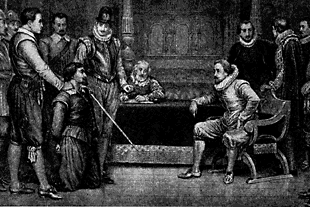Guy Fawkes Day

The anniversary of the famous Gunpowder Plot
Gunpowder, treason and plot.
I see no reason why gunpowder, treason
Should ever be forgot...
November 5th marks the anniversary of the Gunpowder Plot, a conspiracy to blow up the English Parliament and King James I in 1605, the day set for the king to open Parliament. The anniversary was named after Guy Fawkes, the most famous of the conspirators.
 The unfortunate conspirator Fawkes appears before his intended victim. |
Uprising of English Catholics
It was intended to be the beginning of a great uprising of English Catholics, who were distressed by the increased severity of penal laws against the practice of their religion. The conspirators, who began plotting early in 1604, expanded their number to a point where secrecy was impossible.
The group included Robert Catesby, John Wright, and Thomas Winter, the originators, Christopher Wright, Robert Winter, Robert Keyes, Guy Fawkes, a soldier who had been serving in Flanders, Thomas Percy, John Grant, Sir Everard Digby, Francis Tresham, Ambrose Rookwood, and Thomas Bates.
Brought to Light by Anonymous Letter
Percy hired a cellar under the House of Lords, in which 36 barrels of gunpowder, overlaid with iron bars and firewood, were secretly stored. The conspiracy was brought to light through a mysterious letter received by Lord Monteagle, a brother-in-law of Tresham, on October 26, urging him not to attend Parliament on the opening day.
The 1st earl of Salisbury and others, to whom the plot was made known, took steps leading to the discovery of the materials and the arrest of Fawkes as he entered the cellar. Other conspirators, overtaken in flight or seized afterward, were killed outright, imprisoned, or executed.
Fireworks, Bonfires in England
Among those executed was Henry Garnett, the superior of the English Jesuits, who had known of the conspiracy. While the plot was the work of a small number of men, it provoked hostility against all English Catholics and led to an increase in the harshness of laws against them. Guy Fawkes Day, November 5, is still celebrated in England with fireworks and bonfires, on which effigies of the conspirator are burned.
The Columbia Electronic Encyclopedia, 6th ed. Copyright © 2005, Columbia University Press. All rights reserved.
